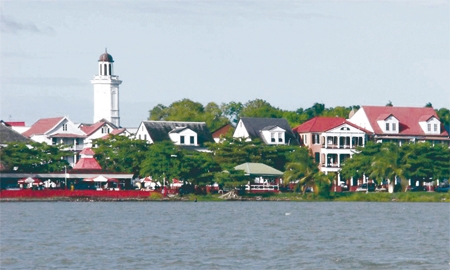
How do you see Suriname as the example to follow in the region in terms of food production?
Suriname will be the food producer of the Caribbean, based on the potential we have in agriculture, animal husbandry and fisheries. Around 15% of Suriname’s area is developed and the rest is forest.
Food safety and food security are relevant. We are producing enough food for our country, but we have to export. That means that we have to look at how safe the food that is being produced is. We are working towards achieving international standards and we want our facilities to be certified for international standards so we can contribute to global food production.
How is the government working to become the main supplier of basic foods to the Caricom region?
One of our policies is to increase production up to the area that has been allocated and then expand that area step-by-step. The climate is really changing, so that has forced us to look at horticulture production. Most of our vegetables are being produced in open fields, so we are moving this to a more protected environment, in greenhouses. We are going to export these vegetables. A lot of measures are being taken to create an environment for production.
"Suriname will be the food producer of the Caribbean, based on the potential we have in agriculture, animal husbandry and fisheries... We are working toward achieving international standards and we want our facilities to be certified for international standards so we can contribute to global food production." Hendrik Setrowidjojo, |
Which agricultural products have the most potential for development in Suriname in the near future?
We are looking at agriculture and animal husbandry. We are looking at what the market needs, and there is a large market for our products in the Caribbean. So instead of bringing them all the way from New Zealand or from across the world, we think we can produce sheep and goats for the region. We are bringing in cattle from other countries, which are suitable for our conditions. We are starting a program to change the breeds we have here for beef and dairy cattle. In so doing, we want to provide the Caribbean market with equal food standards, which they are used to at home.
How important is the fishing industry and its auxiliary infrastructure for Suriname?
In the past we had a lot of fisheries in Suriname, but in recent years this has declined. The policy is now focused on sustainable fisheries and in order to do this, we need a coastguard to see what is happening within our waters. We are looking at fishermen and ships in the water and sustainable marine resources.
Additionally, to maintain sustainability in the sector, we have decreased the number of fishing days in order to give the stock a chance to replenish.
We have recently seen how Suriname’s Seabob fishery was awarded with Marine Stewardship Council (MSC) labeling. We are studying the species and we are looking at the harvest of the species and how healthy the population is.
We are looking at fishing methods and how fish are harvested. We use a code of conduct, which gives us a conservative figure based on what we are doing. We monitor the tonnage they catch and what they catch. Before there were 30 boats but now we brought it back to 22. They cannot go beyond a certain depth level. They have a system so we can track where they are via satellite. If they go under that depth, they will have a problem because it will be reported.
We also aim to develop more aquaculture. We work together with the private sector, looking at what can be done within aquaculture.
What implications has the MSC label had for the industry?
Comparing past and present figures, we are exporting less now than before. But this does not necessarily mean that this was bad for the economy. With the labeling, you can charge higher prices.
Recovery in the fishery sector is not something you will see overnight; it takes time to recover. We will see the results of our investment after one or two years. We will put other measures into place like monitoring the permit and vessels in the water. We want to contribute to the growth of the economy. It is not about making money for one year, but it is about making money for years to come.
Could you tell us what initiatives the government has to promote sustainable fishing and agriculture?
We are earning income at the moment from bauxite, gold and the oil sector, but these are temporary. Agriculture is sustainable. We are looking for markets that are interested in agriculture and organic farming and using the production environment in a sustainable manner. By doing this, we can ensure that production will be for years. One thing we are sure about is that people eat: they ate yesterday, they are eating today and they will eat tomorrow.
1 COMMENT
I own a chemical company located in North Carolina. We manufacture industrial cleaners, agriculture micronutrients and food preservatives. I want to contact your ministry of agriculture to determine if there are synergies between my company and the country of Suriname.